The best SEO tool is the one that suits your needs. However, our main goal today is not to find the winner between Ahrefs and Similarweb. We will go over their differences and similarities.
In the world of digital marketing and SEO, selecting the right tools to drive your strategy is crucial. Two of the most well-known platforms in this space are Ahrefs and Similarweb.
While both offer valuable data to improve online visibility, they cater to slightly different needs.
Ahrefs focuses more on SEO-specific tools, such as backlink analysis and keyword research. Meanwhile, Similarweb offers broader insights into traffic sources, audience behavior, and market trends.
In this comparison, we’ll explore the key differences between Ahrefs and Similarweb, helping you understand which tool is better suited to your goals.
Table of Contents
Differences Between Ahrefs and Similarweb
Both Ahrefs and Similarweb are widely used tools in digital marketing, but their focus areas and features differ significantly. Thus, they are suited for different kinds of users and goals.
Here’s a breakdown of their core differences-
Primary Focus
- Ahrefs: Primarily focused on SEO and backlink analysis, Ahrefs is the go-to tool for those who want to improve their website’s search engine rankings.
With robust features for site audits, keyword research, and competitor analysis, Ahrefs offers a comprehensive approach to improving organic visibility.
Its backlink database is one of the largest in the industry, making it particularly valuable for link-building and SEO strategy.
- Similarweb: Unlike Ahrefs, Similarweb specializes in providing a more holistic view of a website’s performance. It excels in traffic analytics, audience insights, and competitive research.
Rather than focusing solely on SEO, Similarweb helps marketers understand broader digital marketing strategies, including traffic sources, market trends, and audience engagement.
Core Features
- Ahrefs: This tool provides detailed information on organic keywords, backlinks, site health, and more.
It’s especially beneficial for users who want to explore the technical aspects of SEO, such as finding new link-building opportunities.
- Similarweb: Known for its traffic intelligence, Similarweb offers insights into a website’s total traffic, audience demographics, geographical distribution, and more.
It also provides competitive benchmarking, allowing users to see how they compare to competitors in terms of web traffic and overall digital performance.
User Experience and Data Presentation
- Ahrefs: Offers a data-rich, SEO-specific interface that can be overwhelming for beginners. Its detailed reports cater to advanced users who are familiar with SEO metrics.
- Similarweb: Presents its data in a more digestible, user-friendly format. So, it’s easier for marketers or business owners who may not be SEO experts but need insights into broader digital performance.
In summary, Ahrefs is the superior choice for those focusing on SEO and backlink strategy. Meanwhile, Similarweb stands out for traffic analysis and market research.
Similarweb Overview
Similarweb is a powerful digital intelligence platform that provides users with in-depth insights into a website’s performance.
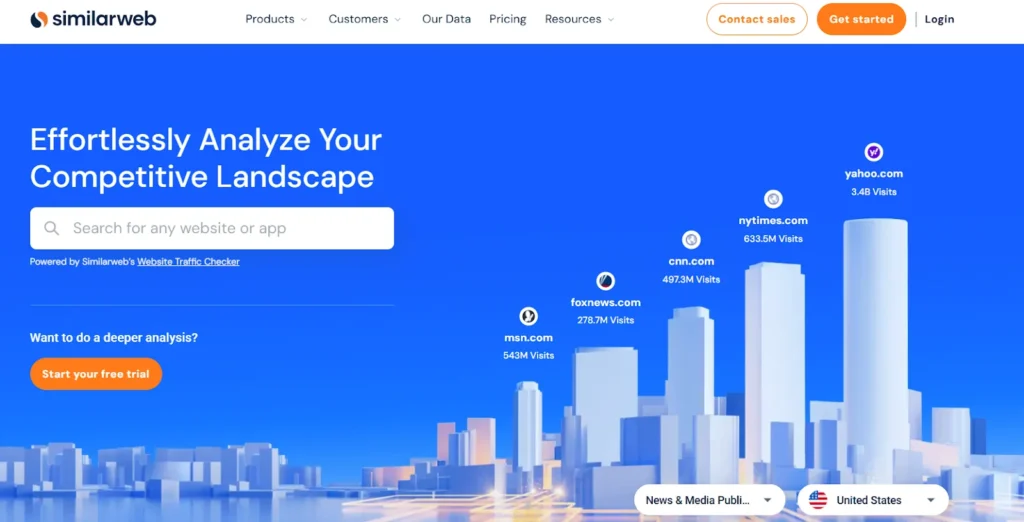
It works across various channels, including traffic analytics, audience engagement, and market trends. Unlike tools focused solely on SEO, Similarweb offers a broader perspective of a website’s overall digital performance.

It is an excellent resource for businesses and marketers who want to understand their own and their competitors’ metrics.
Similarweb’s tools help companies identify market opportunities, track industry trends, and optimize digital marketing strategies across multiple platforms.
Core Features of Similarweb
Let’s look at the features that make Similarweb an excellent tool in the industry.
Traffic Analytics
Similarweb’s traffic analytics offer a comprehensive overview of how users interact with a website. It tracks total traffic volume, traffic sources, user engagement, and bounce rates.
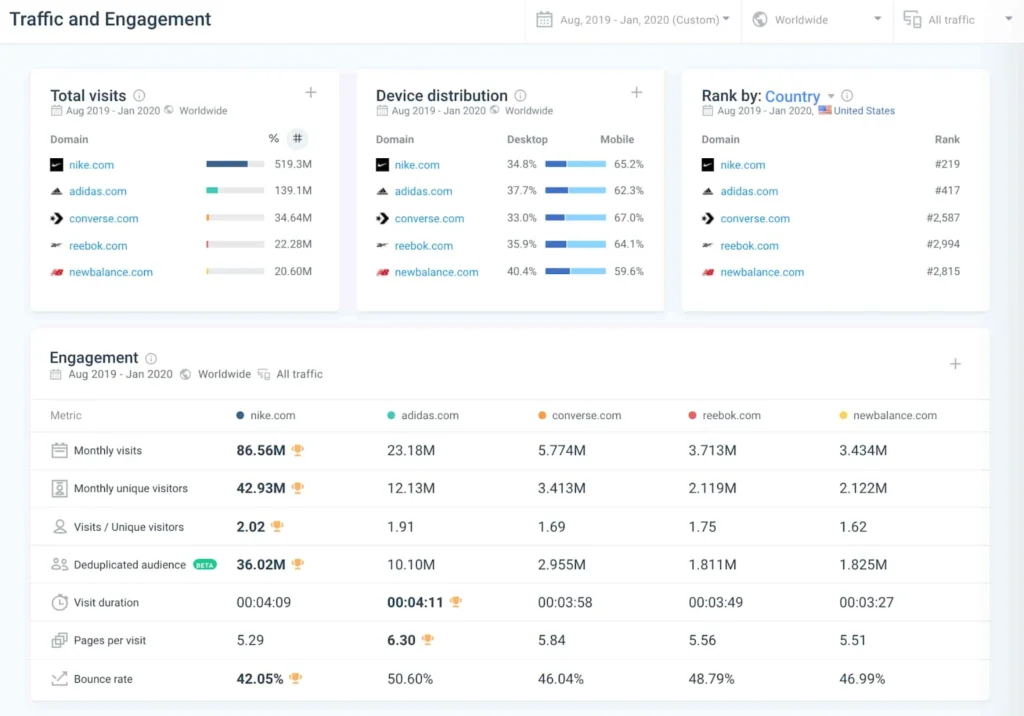
Users can break down traffic by channel, such as organic search, paid search, direct traffic, referrals, and social media.
This allows businesses to identify which sources are driving the most visitors to their website and optimize accordingly.
Audience Insights
One of Similarweb’s standout features is its ability to provide detailed audience insights. This includes demographic information like the age, gender, and geography of website visitors.

Additionally, Similarweb reveals interests and affinities, allowing businesses to tailor their content and campaigns more precisely.
Understanding the audience can also help companies adjust their digital strategies to meet customer expectations and increase engagement.
Competitive Benchmarking
Similarweb’s competitive research tools allow businesses to compare their performance against competitors. Users can assess market share, identify areas for growth, and track industry leaders.
This feature is particularly useful for industries that rely on staying ahead of trends and outmaneuvering competition.
Industry Analysis and Market Trends
Similarweb provides valuable insights into industry trends and market share. Tracking the performance of leading websites within specific industries helps businesses understand the broader market landscape.
This feature is perfect for strategic planning, product launches, and expansion into new regions or sectors.
Advertising Intelligence
Similarweb also tracks advertising strategies, revealing which display ads or keywords competitors are using.

This can give businesses valuable information to refine their own paid search or display advertising campaigns. So they won’t be missing out on lucrative opportunities.
Cons of Similarweb
- Data Accuracy: Similarweb’s data is based on sampling rather than comprehensive crawling, meaning traffic estimates might not always be 100% accurate.
- Limited Keyword Data: Compared to Ahrefs, Similarweb provides minimal insight into SEO metrics such as keyword research or backlink analysis. This could be a limitation for those seeking detailed SEO performance data.
- Pricing: The platform’s most valuable features are locked behind high-tier pricing plans, making it less accessible to businesses with limited budgets.
Ahrefs Overview
Ahrefs is one of the most widely respected and comprehensive SEO tools available. It is known for its robust features, which aim to improve a website’s search engine ranking and online visibility.
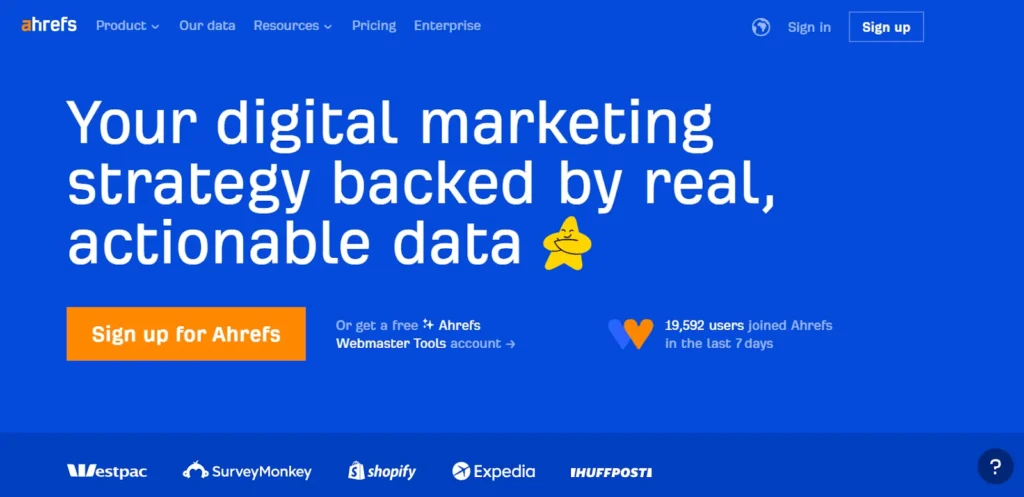
It excels in areas like backlink analysis, keyword research, site audits, and competitive analysis.
Ahrefs is particularly popular among SEO professionals and digital marketers who require in-depth insights to optimize their organic performance.

With one of the largest backlink databases in the industry, Ahrefs is a go-to platform for anyone serious about SEO.
Core Features of Ahrefs
Next, it’s time to check what Ahrefs brings to the table for its users.
Backlink Analysis
One of Ahrefs’ strongest features is its backlink database, which is considered one of the largest in the world. With its Site Explorer tool, users can analyze any website’s backlinks, referring domains, and anchor text.

This is especially useful for-
- Identifying link-building opportunities
- Assessing the strength of competitors’ backlink profiles and,
- Finding new content or link targets
Ahrefs provides detailed metrics on the quality and relevance of backlinks, helping businesses build a more effective link-building strategy.
Keyword Research
Ahrefs provides an incredibly detailed Keyword Explorer tool that gives insights into-
- Keyword search volume
- Keyword difficulty
- Click-through rates and,
- Traffic potential

Users can filter through millions of keyword suggestions and long-tail phrases to discover opportunities to rank higher on search engines.
The keyword difficulty metric is particularly valuable for users who want to prioritize efforts on more achievable rankings.
Site Audits
Ahrefs offers an advanced site audit tool that scans websites for common technical SEO issues, such as-
- Missing meta tags
- Broken links
- Slow page speeds and,
- Duplicate content
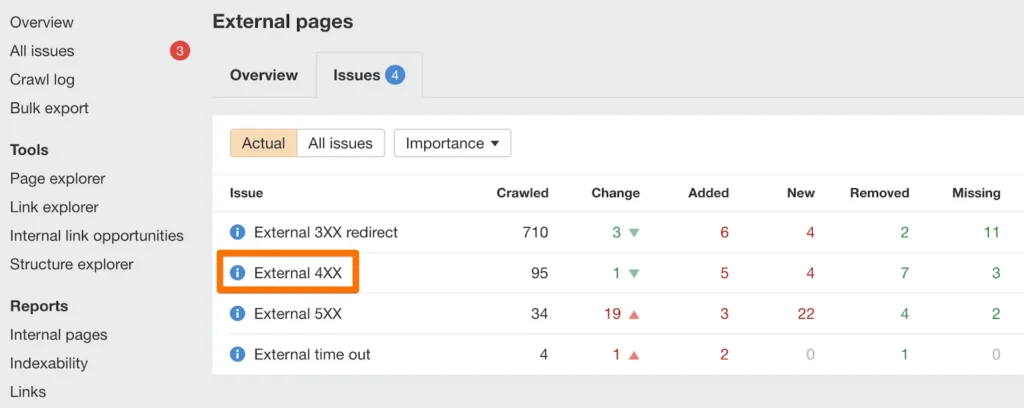
This tool gives a site an overall health score and provides detailed reports on what needs to be fixed to improve rankings. It’s highly useful for businesses looking to improve their websites’ technical SEO.
Competitor Analysis
Ahrefs allows users to conduct in-depth competitor analysis, helping them understand-
- Where competitors rank
- Which keywords they are targeting and,
- How they are building their backlink profiles

The Content Explorer also lets users identify the most popular content in any niche, providing inspiration and insights into what works.
Content Research
Ahrefs offers a Content Explorer that helps users identify high-performing content within their niche.
It reveals which content pieces are generating the most backlinks, social shares, and traffic. This tool is great for content marketers looking to create similar high-performing content.
Rank Tracking
Ahrefs provides rank-tracking tools to monitor how a website’s rankings evolve. You can track keywords, assess fluctuations in rankings, and adjust your SEO strategies accordingly.
Cons of Ahrefs
- Pricing: Ahrefs is on the more affordable side of the two at the moment. However, it can still appear expensive for smaller businesses or freelancers.
The entry-level plan is suitable for smaller sites, but those managing multiple sites or large-scale projects will need to opt for higher-tier plans.
- Learning Curve: Due to the wide range of features, Ahrefs has a steep learning curve. Beginners might find the interface overwhelming, especially if they’re not already familiar with SEO metrics.
- Limited Focus on Local SEO: While Ahrefs excels in global SEO, it doesn’t provide the same level of tools or insights for local SEO as other platforms like Moz or SEMrush.
Pricing Comparison Between the Tools
One key consideration when choosing between Ahrefs and Similarweb is the pricing structure of each platform.
While both tools offer powerful features, their pricing models vary. This could influence your decision depending on your business size, needs, and budget.
Ahrefs Pricing
Ahrefs offers four pricing plans based on the size and needs of your business.

Lite Plan ($129/month)
This plan is best for individuals or small websites. It includes access to essential features like Site Explorer, Keyword Explorer, and backlink analysis. It’s limited to one user and provides a restricted number of reports and data points.
Standard Plan ($249/month)
Ideal for growing businesses, the Standard plan includes expanded access to rank tracking, site audits, and content exploration tools. This plan allows for multiple users and offers more generous data allowances.
Advanced Plan ($449/month)
This plan is suitable for larger teams and businesses with more demanding needs. It provides access to historical data, advanced reporting, and the ability to track more keywords and backlinks.
Enterprise Plan ($1499/month)
Aimed at agencies and large teams, this plan offers full access to Ahrefs’ extensive suite of tools, perfect for users with numerous websites and clients.
Ahrefs also offers a 7-day trial for $7, which gives users a brief window to test out the tool before committing.
Similarweb Pricing
Similarweb Web Intelligence offers four paid plans and one free plan.
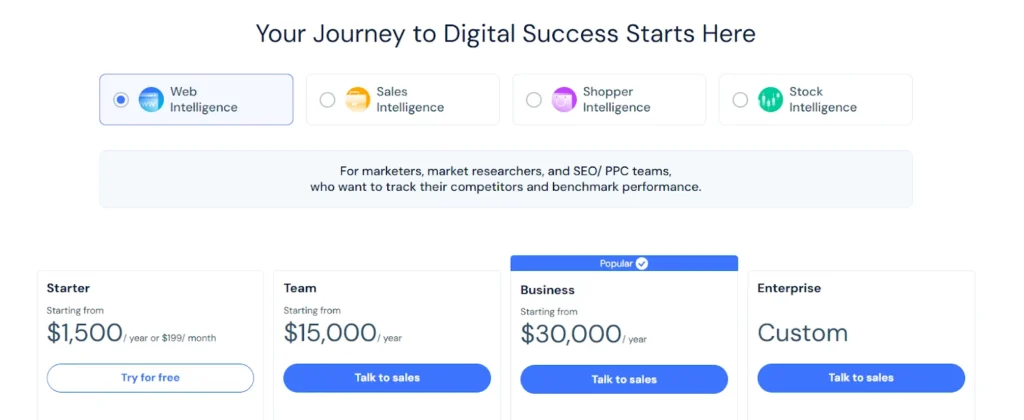
- Starter: $199 per month (or $1,500 yearly)
- Team: $15,000 per year
- Business: $30,000 per year
- Enterprise Plan: Custom pricing
Meanwhile, its Sales Intelligence has three paid plans.

- Individual: $129 per month (or $1,200 per year)
- Business: $2,800 per year
- Enterprise: Custom pricing
Note that all the prices mentioned for Similarweb are for ‘per user.’
In summary, Similarweb is typically priced higher, especially for more comprehensive plans, while Ahrefs offers a more budget-friendly entry point with free tools.
Ahrefs provides extensive SEO tools for businesses focused on SEO. In contrast, Similarweb offers better value for those seeking traffic analysis and market insights at a competitive price.
Conclusion
In conclusion, both Ahrefs and Similarweb offer powerful SEO and digital marketing tools, but their pricing and feature sets cater to different needs.
Ahrefs excels at providing detailed SEO metrics, such as backlink analysis, keyword research, and site audits. It’s ideal for businesses focusing on improving organic search rankings.
On the other hand, Similarweb is more geared toward competitive analysis, traffic insights, and audience behavior, offering broader market intelligence.
Your choice between these two tools will depend on your primary goals: SEO-focused or market and traffic research.
Both platforms offer significant value, but understanding their pricing structures will help you make the best decision for your budget.


